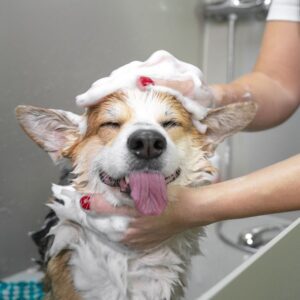Apple cider vinegar is the best home remedy for various issues, including weight loss, digestive problems, and acne. But can it also stop dogs from peeing?
There’s no denying that apple cider vinegar has some impressive health benefits. It’s rich in acetic acid, which has been shown to lower blood sugar levels, promote weight loss, and protect against heart disease.
But does apple cider vinegar also have the ability to stop dogs from urinating? Unfortunately, this claim is not supported by any scientific data.
However, some pet owners swear by it. So what’s the truth? Let’s take a closer look.
Does Apple Cider Vinegar Stop Dogs from Peeing?

There is a lot of contradicting information available regarding whether apple cider vinegar (ACV) helps prevent dogs from peeing inside your house.
While some pet owners swear by its effectiveness, others claim it does nothing to deter their furry friends from relieving themselves indoors. So, what’s the truth?
According to some experts, ACV may indeed be able to help with this problem. Dogs have a strong smell, and the acetic acid in vinegar is thought to act as an unpleasant scent.
It could discourage your dog from urinating inside if they associate the smell with getting scolded or punished.
Of course, it’s important to note that ACV will not work for all dogs. Some may not be bothered by the scent, while others may even find it pleasant! Suppose you’re considering using ACV to stop your dog from urinating inside.
In that case, it’s best to consult with a veterinarian or animal behaviorist first to see if it’s likely to be effective in your case.
How Does Apple Cider Vinegar Work?

Anecdotal research shows that apple cider vinegar helps prevent dogs from urinating inside the home. But how does it work? Does science support these claims?
Apple cider vinegar is an acidic substance. When diluted and applied to surfaces, it can change the pH balance of that surface. It can make it less appealing for dogs to urinate.
In addition, the scent of apple cider vinegar may also deter dogs from peeing in areas where it has been applied.
Dogs are considerably better at detecting smells than people are. So, even if we can’t smell the vinegar, your dog may be able to pick up on its scent and be deterred from urinating in that area.
Some evidence suggests that apple cider vinegar may also have antibacterial properties. It means it could help to reduce the risk of infection if your dog does happen to urinate on a surface that has been treated with apple cider vinegar.
So, there are a few different ways in which apple cider vinegar may be effective at deterring dogs from urinating indoors. However, it’s important to remember that every dog is different and what works for one may not work for another.
If you’re considering using apple cider vinegar to stop your dog from urinating indoors, it’s always advised to see your veterinarian first.
What are the risks of Apple Cider Vinegar?

Apple cider vinegar is a famous home remedy for many different ailments in humans, but is it also safe and effective for dogs?
While there are some benefits to using apple cider vinegar for dogs, there are also a few dangers that dog owners should look for before using apple cider vinegar.
- One of the most significant risks of using apple cider vinegar on dogs is its potential to cause digestive upset. Apple cider vinegar is acidic and can irritate the lining of the stomach or intestines if used too high of a concentration.
It can lead to vomiting, diarrhea, and other gastrointestinal issues. It’s important to always dilute apple cider vinegar with water before giving it to your dog and to start with small amounts to avoid any problems.
- Another potential risk of using apple cider vinegar for dogs is that it can interact with certain medications. For example, apple cider vinegar can increase the absorption of some antibiotics, making them more effective.
However, it can also decrease the absorption of other medications, such as those used to treat heart conditions or diabetes.
If you’re considering using apple cider vinegar for your dog, talk to your veterinarian first to ensure it won’t interact with any medications they may be taking.
Even though there are specific hazards involved, apple cider vinegar for dogs may be a secure and efficient solution to treat various conditions when appropriately used.
Always dilute it with water and start with small amounts until you know how your dog will react.
How to Stop Dogs from Urinating by Using Apple Cider Vinegar?
If you’re seeking a natural solution to get your dog to quit urinating inside the home, apple cider vinegar (ACV) may have been recommended.
The acetic acid in ACV is thought to modify the pH of your dog’s urine, making it less attractive to mark. In addition, the pungent smell of vinegar may deter your dog from peeing inside.
However, it’s essential to use ACV correctly to avoid any risks.
- When using ACV to stop your dog from peeing in your house, try to dilute the vinegar with water at a 1:1 ratio. For example, for every cup of ACV, add one cup of water.
- Apply the solution directly to any areas where your dog has peed inside, using a sponge or spray bottle. Additionally, you can cover the area with a cloth that has been soaked in the mixture.
- It’s essential not to use full-strength vinegar on your dog’s skin, as this could irritate it. Suppose you’re unsure whether your dog is sensitive to ACV; patch tests a small area before applying it more broadly.
- Also, avoid getting any vinegar solution in your dog’s eyes, as this could cause discomfort.
If used correctly, ACV can be an effective way to stop your dog from urinating inside the house. A veterinarian should be seen immediately if the issue doesn’t go away since there can be an underlying medical disease.
FAQS:
Q: What smells will stop dogs from peeing?
A: A few different smells can stop dogs from peeing. One is vinegar. Vinegar is a strong smell that dogs don’t like, so adding a bit to your urine can help keep them away. Another is lemon. Lemons are also strong-smelling, and dogs will usually avoid them.
You may also give utilizing essential oils like eucalyptus or peppermint a try. These oils have strong scents that dogs don’t like and can help keep your urine smelling fresh.
Q: What is the best dog urine deterrent?
A: Many products on the market claim to be the best dog urine deterrent. However, there is no one-size-fits-all solution. Some dogs may be deterred by a particular product, while others may not be affected at all.
Testing out several items until you find one that works for your dog is the best approach to discovering what works for them.
Q: Why does my potty-trained dog keep peeing in the house?
A: There could be some reasons your potty-trained dog is peeing in the house. It could be that they are not feeling well and must go more frequently. They could also be locating their territory because they feel like a new dog is in the house.
If you have recently added a new pet to the family, your dog may feel threatened and try to mark its territory. Lastly, your dog may need more potty breaks during the day. If you notice that your dog is going more frequently, you may want to increase the number of potty breaks they get each day.
Q: Why does my dog pee on everything?
A: There could be some reasons your dog is peeing on everything. One possibility is that your dog is marking its territory.
Dogs may use their urine to mark their territory and let other dogs know it is their domain since they have a keen sense of smell.
Another possibility is that your dog is anxious or stressed. Your dog may be bothered if they are urinating more frequently than usual.
If you’re unsure why your dog is peeing on everything, it’s best to talk to your veterinarian. They can help you figure out what’s happening and how to fix it.




